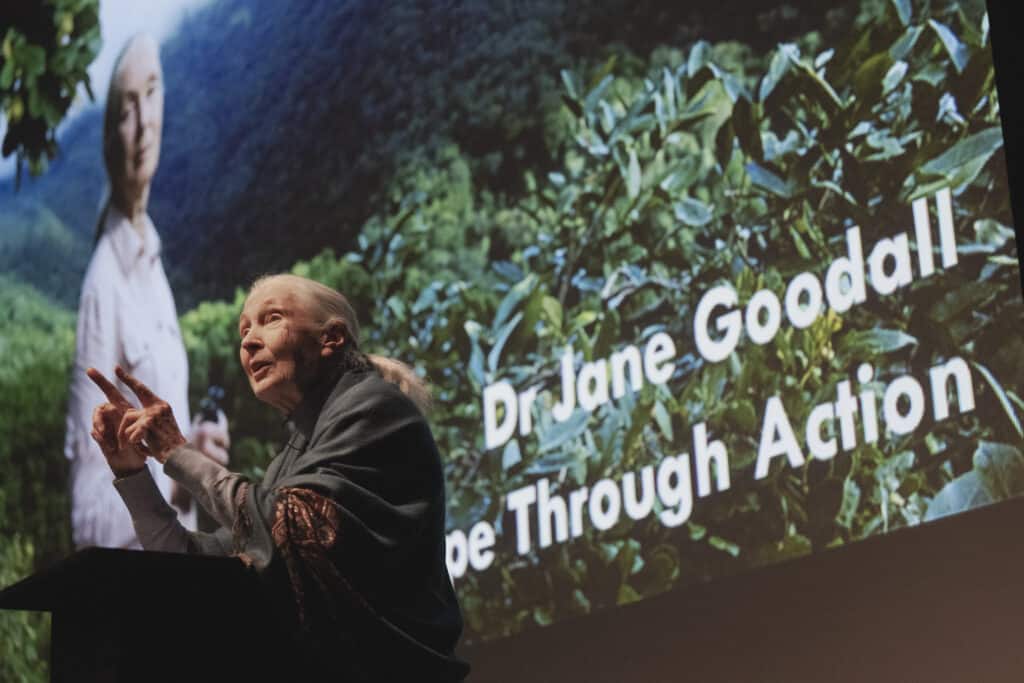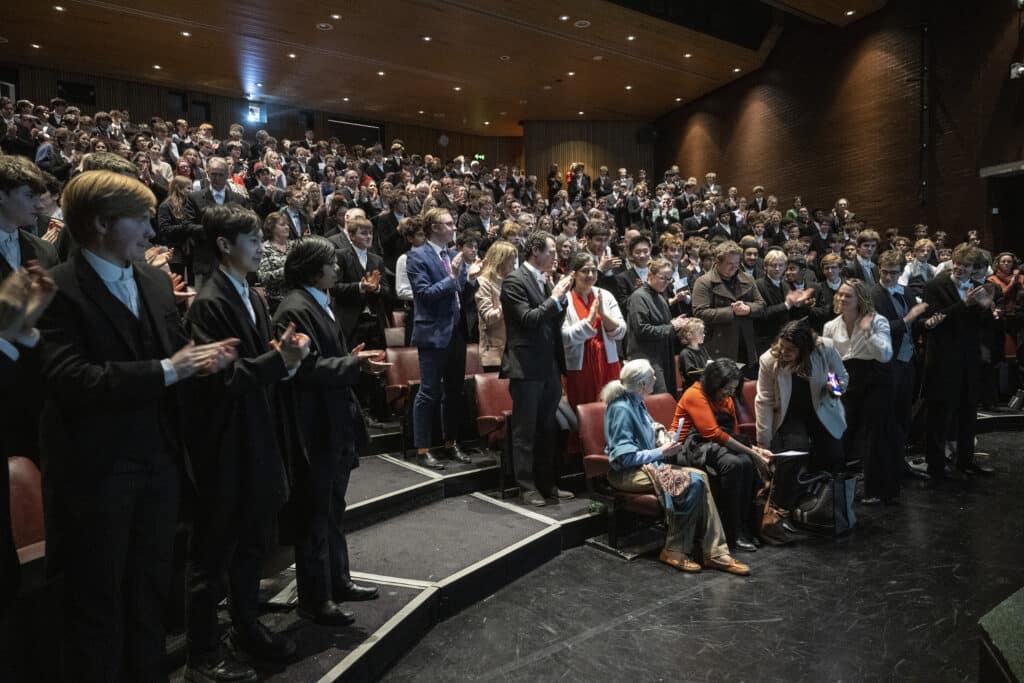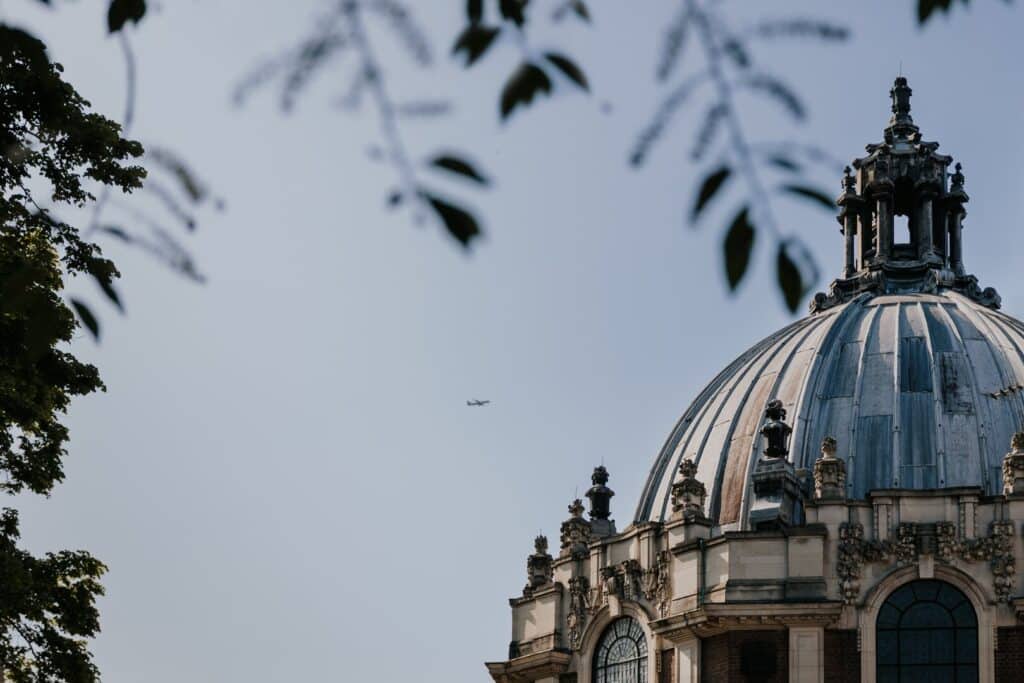Dr Jane Goodall’s is a name instantly recognised around the world, not just to those working in primatology but to conservationists, psychologists, environmentalists and all who have heard of her revolutionary work with chimpanzees. The first person to document tool use in non-human animals as a “young girl who had never completed high school”, Dr Goodall went on to have an illustrious career spanning more than 60 years. There are 25 Jane Goodall Institutes around the world that bear her name and programmes include Jane Goodall’s Roots & Shoots, the institute’s humanitarian and environmental programme for young people of all ages now active in more than 65 countries.
Entering to a standing ovation from Etonians and students from nine Thames Valley Learning Partnership (TVLP) schools, Jane Goodall, aged 88, spoke for an hour, without notes on “Hope through Action,” holding the audience enthralled as she described her life and work. Opening with a chimpanzee distance greeting call, Dr Goodall modestly stated she was constantly surprised by the warm receptions she receives everywhere – to her “it’s only me.” She was “born loving animals,” saving up as a wartime 10-year-old to buy Tarzan of the Jungle from the local Bournemouth bookshop, which fascinated her – although she did believe Tarzan had “married the wrong Jane.” An incredible visit to a schoolfriend’s family farm in Kenya gave her the chance to see “the Africa of her dreams,” as she vividly described seeing flying fish and dolphins on the boat trip there around the horn of Africa.
Goodall had trained at a secretarial college, fearing she’d never get to work with animals, but a chance meeting with paleoanthropologist Dr. Louis Leakey in Kenya, who happened to need a secretary, sprung her career into the animal world. “It was magical,” she tells us, “we were allowed to keep a pet bush baby – Levi – in a gourd in the office, who would pee on his hands before jumping on visitors.” Dr Goodall “had always dreamt of being out with wild animals,” and Leaky thought she would be perfect for a new chimpanzee study, which he later revealed was in part because she hadn’t been to university so thought a lot more freely than most academics. Her “amazing mother” agreed to accompany her in Tanzania for the first four months of her initial visit to Gombe as the British government refused to allow her to travel alone. This was in 1960 and the chimpanzees would run away upon seeing a “strange upright white ape for the first time in Gombe National Park in Tanzania”. Around a month into the study, learning a lot about chimp behaviour and slowly acclimatising them to her presence, the key revelation came. Goodall observed a chimp she named “David Greybeard” poking long twigs into termite mounds to scrape out the tasty insects – the first ever tool use documented in animals.

Two years later, filmmaker Hugo van Lawick (who later became Jane’s first husband) was sent by the National Geographic to document the research with images to accompany articles and help spread the learning about the wild chimpanzee families. Knowing that her research would never be taken seriously without a university degree, Dr. Leakey arranged for Jane Goodall to study for a doctorate in Ethology at Cambridge. At first she was told by some professors that her methodology at the Gombe Stream National Park had been wrong. She isn’t the arguing type and explained how she let her supervisors “find out for themselves” the value in her approach, with the help of van Lawick’s films and photographs.
When she flew over Gombe in a small plane in the 1980s, Dr. Goodall “wasn’t prepared to see such visible devastation” happening to the area around the forest of Gombe. She learned at a conference in Chicago in 1986 that this was happening all over the chimpanzee range of Africa and pivoted from scientist to become an environmentalist and activist. Among the programmes implemented by the Jane Goodall Institute is Tacare, which began with a group of local Tanzanians visiting communities around Gombe to learn what they needed to improve their lives. These projects ranged from clean running water and latrines, to helping keep girls in school and higher education, microfinance to start small businesses, etc. This has enabled those living in 104 villages to become our partners in conservation. The project continues to be hugely successful across six other African countries.

Wrestling with her generation’s guilt around climate change, Dr Goodall said “students are right in thinking we’ve compromised your future – we’ve been stealing your future.” However, she insisted that “we do have a window of time to work together” and the Roots & Shoots programme involving hundreds of thousands of young people globally provides hope. Her motto “hope through action” conveys how taking clear steps can make tangible difference and provide hope. Every group volunteering under the Roots & Shoots programme must run projects that help people, animals, and the environment, and the initiative is now in more than 65 countries from Australia to North Korea, growing in the UK too catalysed by Dr Goodall’s talks.
Goodall concluded her talk with a video of an orphan chimpanzee whom she had only met that day. The chimp had been nursed back to health and was being released onto an island in the Koilou river in Republic of Congo. When the cage door opened the newly released chimp embraced her before walking off into the trees. “I really do have hope for the future”, thanks to young people, the “indomitable human spirit,” and human intellect. “Humanity is at the mouth of a long, dark tunnel, but we have a small star of hope at the end.”
We sincerely thank Dr Jane Goodall DBE for her time and phenomenally rousing talk, and we hope to live up to her inspiration and work together for the future of our planet.
For further information about the work of the Jane Goodall Institute UK visit:



